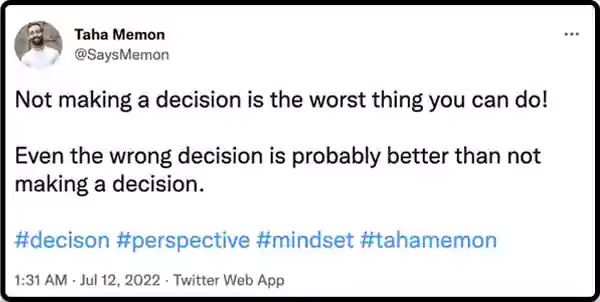How to Start Making Smarter Business Decisions?

With over, 582 million entrepreneurs on the earth, Businesses are something that relies on a “SMART” model of decision-making. Here, “S” stands for significant information, “M” stands for meaningful data, “A” for actionable intelligence, “R” for relevant information, and “T” for time. In 2020, the USA witnessed a boom, with an increase of 95% in new business applications, leading to its significant growth since then. The World Bank believes that Small and Medium Enterprises (SMEs) are the backbone of the world economy.

Business holders indulged themselves in big and small decision-making constantly. Likewise, they need to be smart enough to make informed decisions to witness growth and improvement in their business. But, when you place yourself, you will find, it’s not always easy to start making smart decisions. What you can do is follow a few things that aid you in comprehending every nook and corner of business and making smarter decisions. This article will pave the way for you to thrive on your goals and reach higher levels of success.
Seek Input from Others
Business leaders read this, the best thing you can do is to ask for input from others. First, specify and figure out how you are going to measure your success, then ask your friends, family, or mentors what their perceptions are. But wait, the term leadership is associated with the misconceptions that say business leaders should know the answers or drill.

But on the contrary, gathering input from others changes their way of thinking. Consequently, they will see things differently. Although it’s good to stand your ground, there is nothing wrong with taking bits of advice or suggestions. Those would definitely aid you in making an accurate judgment, rather than making the wrong ones and being a bummer down the line. So, without any hesitation, seek advice from whom you trust and respect.
Explore All Options

Being a businessman or businesswoman, you should always explore varied options that come your way when it’s actually the time to pass important judgments. A good way to achieve that is to list down all the open options in front of you. Then, try to determine an obvious option that you gravitate towards naturally. Now, evaluate the deeper impact that solution could have in the future. In complex situations involving significant changes within an organization, seeking the expertise of an organizational change management consultant can greatly enhance your decision-making process. These professionals specialize in navigating and facilitating successful transitions, providing invaluable insights, strategies, and support to ensure smooth and effective implementation of organizational changes.
Similarly, explore the rest of the options in depth. You never know, you might discover that the options you are taking for guaranteed will have a binge. For instance, the less obvious solution can be the one that actually has more upsides as compared to the first that came to mind.
Utilize Data Analytics

In this fast-paced world and with emerging technologies, businesses should lean towards utilizing data analytics. The fact that judgments can be a lot easier with data science and statistics. Because data analytics serves deeper insights into all aspects of the business, that’s a novel approach, isn’t it? However, comes in handy while making intelligent decisions. It can also help you in managing different types of funds in the tech age.
Moreover, you and your co-workers will benefit greatly from data analytics courses. As it contains tools that will help to utilize data analytics. This course will help you pass data-based decisions, optimize processes, streamline operations, drive growth, build an enhanced marketing strategy, and many more.
Learn from Previous Decisions

Try to look at or consider decisions as an opportunity to learn. Win and Loss are two probable outcomes in business. In case, you lose, learn from the failure instead. It has proved to be a way to retain more clients by improving your business.
It is seen that even successful leaders make mistakes on particular occasions, but what makes them unique is, that they never let their mistakes roll over and knock their confidence. They firmly view it as an opportunity to learn. As an outcome, do not make similar mistakes in a repetitive manner in the future.
Dealing with failure this way makes you more confident and lets you see your mistakes from a positive aspect. Carry this in mind, it won’t be mismatched with actively trying to make mistakes.
Conversely, you can learn a lot from correct decisions. So, don’t rush, take your time. Practice evaluation and reflection regardless of the outcome.
Address the root cause
You may be asking yourself what kind of data you should be collecting from your employees or co-workers. In many cases, when we encounter a challenging issue, we tend to focus on the symptoms, rather than the root cause of the problem. If we do this, we are likely to re-encounter the same issue in the future.

You may need to address the symptoms as soon as possible, but once that’s done, you’ll always need to devise a plan to address the underlying cause of the issue. Connecting with the people closest to the concern will help you determine what that is. Use the time you spend with them to collect that information.
Although you may need to urgently address the symptoms of an issue, once this is done, you should always develop a plan to fix the root cause, or else the issue is likely to repeat itself.
Know the Difference between short-term and long-term value
Short-termism is the bane of many leaders’ decision-making frameworks. It’s tempting to only think about short-term results, especially when you’re judged solely on the performance of your yearly work.
But the deeper you get into your career, the more evident it is that you’re missing out on long-term value when you don’t pay enough attention to the impact of your decisions in the far away future.

Balancing short-term and long-term is essential for unlocking true value, and the sooner you incorporate it into your decision-making, the better.
Finding the right balance between short-term and long-term risks and considerations is key to unlocking true value.
Make Timely Decisions
If you want to speed up decision-making, the first thing you need to do is figure out what the key components of a good decision are. If you take all the elements into account, then it’s just a matter of dealing with each one with a higher level of urgency.

A lot of leaders put off making decisions because they’re scared of making the wrong choice or, worse, not being liked by their team. However, the amount of time you spend on any one aspect of decision-making should be determined by the amount of risk it follows. Your risk analysis will tell you if you should be more cautious about taking risks or more relaxed.
As a young leader, diving into talent development and learning the skill of decision-making will help you speed up your development and boost your team’s performance. But the higher you get, the more impact it’ll have on your organization’s culture and performance.
Conclusively, this article will definitely help you in making smart decisions related to business. However, you can reach higher levels of success individually or with your company.






